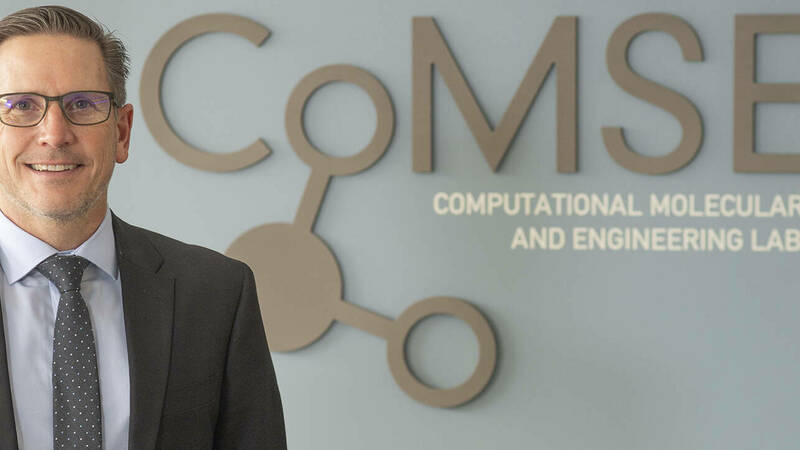
William Schneider
Dorini Family Chair of Energy Studies; Concurrent Professor
- Office
- 250B Nieuwland Science Hall
Notre Dame, IN 46556 - Phone
- +1 574-631-8754
- wschneider@nd.edu
Research Areas
- Physical/Analytical Chemistry
Research Specialties
- Energy
- Theory
Prospective Graduate Students
Biography
| Year | Title |
|---|---|
| 2020-present | Chair, Department of Chemical and Biomolecular Engineering, University of Notre Dame |
| 2009-present | Professor, Department of Chemical and Biomolecular Engineering, University of Notre Dame |
| 2004-present | Concurrent Professor, Department of Chemistry and Biochemistry, University of Notre Dame |
| 2004-2009 | Associate Professor, Department of Chemistry and Biochemistry, University of Notre Dame |
| 1991-2004 | Ford Motor Company |
| 1991 | Ph.D., Ohio State University |
| 1986 | B.Sc., University of Michigan-Dearborn |
Selected Awards
2018 Giuseppe Parravano Memorial Award for Excellence in Catalysis Research & Development
2011 Fellow, American Association for the Advancement of Science (AAAS)
2009 BP Foundation Outstanding Teacher Award for the College of Engineering, University of Notre Dame
Research Interests
Professor Schneider's group applies state-of-the-art first-principles molecular simulation tools, based primarily on density functional theory (DFT), to study a range of problems in heterogeneous surface reactivity and catalysis. These quantum-mecahnics-based calculations take advantage of some of the latest and most powerful computers available to produce accurate predictions of chemical structure, energetics, and reactivity for systems that were impossible to study even just a few years ago. Statistical thermodynamics and kinetics provide the links to macroscopic prediction. The simulations are coupled with simple but powerful concepts of chemical structure and bondingâkey to both the effective use of the tools and extraction of useful physical insight. The group partners closely with experimentalists both to validate results and to provide an avenue for their rapid application.
Current research focuses on heterogeneous reactivity at metal and metal-oxide surfaces. This type of reactivity is common to many environmental processes and underpins many technologies used to mitigate or eliminate the impacts of society on the environment, especially activities related to the production and consumption of energy. Some examples include catalytic removal of emissions from combustion exhaust, catalytic conversion of petroleum fuels, solid-state gas sensing, and fuel cell catalysis. Understanding gained at the molecular level allows us to better control-and ultimately to tailor-chemical systems to perform functions more cleanly, efficiently, and durably. The research group is highly interdsciplinary, cutting across the traditional boundaries of chemical engineering, chemistry, physics, environmental science, materials science, and the emerging field of nanoscience.
Selected Publications
- Wilcox, L. N.; Rebolledo-Oyarce, J.; Mikes, A. D.; Wang, Y. J.; Schneider, W. F. and Gounder, R. "Structure and Reactivity of Binuclear Cu Active Sites in Cu-CHA Zeolites for Stoichiometric Partial Methane Oxidation to Methanol" 2024 ACS Catalysis, 14 (5), pp.3647-3663. DOI: 10.1021/acscatal.3c06181.
- Ghosh, S.; Haycock, D.; Mehra, N.; Bera, S.; Johnson, H.; Roiban, I. L.; Aouine, M.; Vernoux, P.; Thüne, P.; Schneider, W. F. and Tsampas, M. N. "Climbing the Hydrogen Evolution Volcano with a NiTi Shape Memory Alloy" 2024 Journal of Physical Chemistry Letters, 15 (4), pp.933-939. DOI: 10.1021/acs.jpclett.3c03216.
- Lee, G. R.; Yan, C.; Schneider, W. F.; Go, D. B. and O'Brien, C. P. "Observation and Characterization of Vibrationally Active Surface Species Accessed with Nonthermal Nitrogen Plasmas" 2024 ACS Applied Materials & Interfaces, 16 (4), pp.4561-4569. DOI: 10.1021/acsami.3c14965.
- Waitt, C.; Gao, X. Y.; Gounder, R.; Debellis, A.; Prasad, S.; Moini, A. and Schneider, W. F. "Analysis and Augmentation of Guest-Host Interaction Energy Models as CHA and AEI Zeolite Crystallization Phase Predictors" 2023 Journal of Physical Chemistry C, 127 (46), pp.22740-22751. DOI: 10.1021/acs.jpcc.3c05421.
- Goswami, A. and Schneider, W. F. "Mean Field Model Parameterization to Recover Coverage-Dependent Kinetics" 2023 Journal of Catalysis, 426 pp.352-360. DOI: 10.1016/j.jcat.2023.07.013.
- Deluca, M.; Jones, C. B.; Krishna, S. H.; Goswami, A.; Saxena, R.; Li, S. C.; Prasad, S.; Moini, A.; Schneider, W. F. and Gounder, R. "Effects of Zeolite Framework Topology on Cu(I) Oxidation and Cu(II) Reduction Kinetics of NOX Selective Catalytic Reduction with NH3" 2023 Chem Catalysis, 3 (9), 100726. DOI: 10.1016/j.checat.2023.100726.